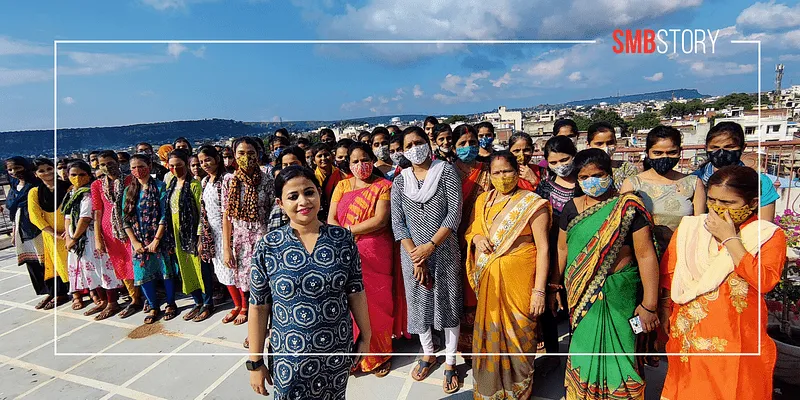With love, from Gwalior: How this couple scaled their handicraft products brand to sell internationally
iTokri was started in 2012 by Nitin and Jia Pamnani. It sells home decor items, printed suit materials, bags, dupattas, neckpieces, cushion covers, and more through its website and ecommerce platforms.
Until 2010, Nitin Pamnani was an award-winning documentary filmmaker. A few years later, he, along with his wife Jia Pamnani, decided to leave Mumbai and settle in his hometown, Gwalior.
Around the same time, the duo noticed that ecommerce was picking up steam. They also had several acquaintances who were dealing in handicraft and handmade products. This compelled them to explore a business opportunity in this segment. Investing Rs 30 lakh from their personal savings, they started working on a platform that would sell artisanal products such as home decor items, printed suit materials, bags, dupattas, neckpieces, cushion covers, and more. In 2012, their project, called , finally went live.
Nitin tells SMBStory that the company went through difficult times between 2012 and 2016. Gwalior, unlike metros, was less developed and lacked the infrastructure to support an ecommerce business.
With limited resources in hand, Nitin and Jia opened an office and a warehouse facility in their home to launch the business. They initially relied on local delivery mechanisms and partnered with in 2015. That is when the brand really took off.
With the number of freight companies on the rise and logistics infrastructure expanding in and around the city, iTokri not just started delivering pan-India but also exported to the US, the UK, Middle East, and Europe.
Today, iTokri, which was started with 20 employees, has grown to become a team of more than 200 members.
The business model
Talking about the company’s USP, Nitin says iTokri is not a marketplace but follows an “inventory-based” business model. The company buys the stock directly from the artisans and then uploads details about the stock on the website.
“Whatever products you see on the website are available with us in the warehouse,” he says.
The motive is to eliminate the middlemen in this ecosystem and release the burden of keeping enormous stocks from the artisans’ shoulders.
“An artisan is not a trader, he is an artist,” Nitin explains, adding that this model worked as artisans were not sceptical of partnering but were happy to sell them the stocks.
Moreover, the brand, which operates only through the online model (website and ecommerce platforms such as Amazon), gives all the information about the creator or the artisan, including the product’s origins. Nitin emphasises that artisans have always been neglected, and he wants to ensure that they are given enough credit in the ecosystem.
Nitin says, over the years, they have been able to double the income of artisans, and in some cases, increase it by three times. Some of them have been able to scale up and become micro-entrepreneurs. He says iTokri’s team trained them to make bills, file GST, etc.
Today, the brand directly impacts the lives of artisans in 500 clusters across the country. It has also tied up with NGOs and other organisations to further expand its business and scale up. It gets around 15,000 orders a month.

iTokri, which was started with 20 employees, has grown to become a team of more than 200 members.
Surviving the pandemic
When the coronavirus pandemic brought the entire world to a standstill, the handicraft industry was trickled as well. There were also several media reports of artisans resorting to suicide, unable to cope with the pressures of the lockdown.
For the first two months, Nitin said the business was down. However, the team started manufacturing masks a few months later, which proved to be a gamechanger for the business.
“When the pandemic struck, we didn’t know how to cope but manufacturing masks saved us,” he points out.
iTokri started manufacturing trendy masks with different designs. The business started stabilising after August 2020 when the company reported a 60 percent increase in sales.
Today, the brand has not just revived to pre-pandemic levels but is doing much better. It added 150 artisans to the company during the last year.
In FY20, the company’s revenue was around Rs 12.7 crore and in FY21, Nitin claims that this number grew to become Rs 20 crore.
The road ahead
In the coming times, Nitin says the brand will focus on launching a clothing line of casual wear. He also adds that the company will continue to focus on building an online and scalable brand.
As per the Development Commissioner Handicrafts (DCH), at present only seven million artisans earn their livelihood through handicraft, a significant drop for the second-largest employment generator after agriculture. Another report by the UN also suggested that over the past 30 years, the number of artisans in the country has dropped by 30 percent.
Does that pose a threat to the industry? “The answer is yes and no,” according to Nitin.
While India has several companies operating in this space (, , GoCoop, , etc), the declining numbers indicate deep-rooted problems within this segment. Urbanisation, growth of the IT industry, increase in urban opportunities, and the growth of the white-collar culture has played a role in shifting the gears for this segment.
“Business is not the challenge, production is the challenge,” he notes.
He says that while several companies are operating in this space, the number of people working in the backend are decreasing, which leading to a drop in production.
But Nitin is hopeful about the future. He says that India and the world at large may be making a shift towards machines but handmade and handicraft items still have significant demand. The COVID-19 pandemic paved the way for “work from home”, which will strengthen rural industries and economies, he says. And this, he believes, might inspire the youth of the country to circle back to their roots and work to strengthen the ecosystem.
YourStory’s flagship startup-tech and leadership conference will return virtually for its 13th edition on October 25-30, 2021. Sign up for updates on TechSparks or to express your interest in partnerships and speaker opportunities here.
For more on TechSparks 2021, click here.
Edited by Kanishk Singh









